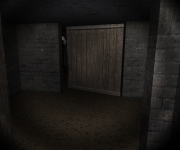Tung Tung Tung Sahur
Tung Tung Tung Sahur transforms a common morning tradition into the center of a horror scenario. In many regions, the drumbeat before dawn is a signal to wake up for Sahur. In the game, this act becomes distorted—each beat carries tension instead of reassurance. Players take the role of someone who repeatedly ignores the warning calls. The third beat doesn’t just mark a missed meal—it marks the arrival of something unknown. What follows is about waking up, and surviving long enough to do so.
Minimalist Mechanics, Maximum Tension
The structure of the game is intentionally bare, putting all focus on sound and timing. Players aren’t given many tools—there’s no combat or escape system in the traditional sense. The only real goal is to avoid what comes after the third call. Shadows move, the environment subtly shifts, and the once-familiar drum becomes a source of anxiety. With no complex puzzles or objectives, every second counts, and the pressure builds naturally with each unanswered beat.
Rooted in Culture, Delivered with Fear
What sets Tung Tung Tung Sahur apart is its direct link to a cultural practice. Instead of building a horror setting from fiction, it uses something grounded and turns it slightly off-axis. That realism is what makes the fear stick—it doesn’t come from monsters or loud sounds, but from the slow breakdown of routine and expectation. The game takes a piece of daily life and quietly rewrites it into something unfamiliar, using restraint and repetition to unsettle rather than overwhelm.







































































